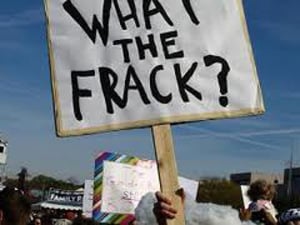
As British Columbia Premier Christy Clark makes her debut in the provincial legislature this week, the media spotlight will likely be on the predictable verbal sparring between her and Adrian Dix, the NDP's recently minted leader, over the Harmonized Sales Tax.
Meaning that Independent MLAs Bob Simpson and Vicki Huntington will have their work cut out for them trying to maintain media focus and public attention on their welcome non-partisan call for the appointment of a special legislative committee to thoroughly investigate unconventional natural gas developments in the province.
It's a call that 21 organizations and prominent British Columbians -- including First Nations, leading environmental organizations, local citizens groups in the natural gas-rich northeast corner of the province, and individual town councilors -- all support, and one that we at the B.C. Office of the Canadian Centre for Policy Alternatives have also endorsed.
For years, the policies of provincial NDP and Liberal administrations alike have been squarely focused on increased exploitation of B.C.'s natural gas resources, which are primarily situated in the Peace River and Northern Rockies regions of the province -- an extensive but remote part of B.C. that is larger than the state of Nebraska. This fact may help to explain why it has fallen to Simpson and Huntington to propose that the time has arrived for a sober assessment of the industry's activities and the role that provincial policies play in shaping them.
It was under the NDP that the one-stop-shop for regulatory energy industry approvals -- the Oil and Gas Commission -- was created in an effort to eliminate the alleged red tape of multiple agencies reviewing applications by natural gas companies to drill gas wells, build roads and situate pipelines. Dan Miller, under whose tenure as energy and mines minister the OGC was created, would go on to do lobbying work for mining and energy company clients, including Enbridge Inc., the company hoping to build an oil pipeline from Edmonton to Kitimat.
Half of BC's natural gas is fracked
It was largely under the Liberals, but also under the NDP, that various breaks on energy industry royalty payments and other credits were offered as inducements to industry expansion.
With billions of dollars having flowed into provincial coffers over the past decade -- much of it in the form of one-time sales of subsurface rights or royalty payments -- and billions more potentially at play, neither Liberal nor NDP MLAs have been particularly vocal about questioning a) whether or not the public should subsidize industry activities; or b) what the cumulative effects of rapidly accelerating industry developments mean for B.C. meeting its greenhouse gas emissions reduction targets or the environment more generally.
This reluctance takes on added significance in light of the rapidly accelerating use of hydraulic fracturing or "fracking" operations to boost natural gas production -- operations that only a few short years ago Liberal and NDP MLAs alike could have been excused for not knowing a thing about. Now fracking is assisting in the production of nearly half of all the natural gas produced in the province, led by companies such as EnCana Corporation, whose former president and CEO Gwyn Morgan went on to become a special advisor to Christy Clark. It is the rapidly emerging usage of this "stimulation" method -- which involves pumping copious amounts of water under extremely high pressure deep underground to crack or fracture "unconventional" formations such as tightly bound shale rock, thereby releasing their gas -- that lies at the heart of Simpson's and Huntington's initiative.
Slurping water
The rapid deployment of hydraulic fracturing at gas pads where numerous wells are located close together -- and where each well is drilled deep into the earth and then drilled out horizontally for two kilometres or more -- is a relatively new phenomenon dating back about a decade and with its origins in the state of Texas. As I wrote last year in a report released by the Program on Water Issues at the Munk School of Global Affairs, natural gas companies in northeast B.C. -- including EnCana, Apache Canada and Talisman Energy -- all increasingly employ fracking technology to boost gas production, in some cases setting industry records for water usage in the process with hundreds of Olympic swimming pools worth of water pressure-pumped underground at some sites.
The Oil and Gas Commission has approved hundreds of temporary water use permits allowing energy companies to divert hundreds of millions of gallons of water from streams, rivers and lakes in the Peace and Northern Rockies regions. Massive water diversion proposals involving longer-term water tenures known as water licences have also been submitted by energy companies to water stewardship officials with the new Ministry of Forests, Lands and Natural Resource Operations. Some of those proposals include diversions out of Williston Reservoir and have resulted in behind-door negotiations between gas companies and BC Hydro over what price the companies should pay for water from the province's largest reservoir, which is the source of much of B.C.'s hydroelectric power.
To date, both the Oil and Gas Commission and the Ministry of Forests, Lands and Natural Resource Operations have failed to consult in any kind of meaningful way with members of the public generally or First Nations specifically about the hundreds of short-term water use permits granted to natural gas companies or the dozens of long-term water licences sought by the industry.
"Public policies are driving the rapid expansion of B.C.'s unconventional gas sector, particularly in shale formations in the Peace Region," Huntington, Independent MLA for Delta South, said in endorsing the call for the appointment of the special legislative committee to review the development of the province's unconventional gas reserves. "It is incumbent on the government to ensure it fully understands the cumulative impacts associated with developing this resource."
Rising public concerns
Both Huntington and Simpson expressed concerns that with prices for natural gas currently low that the provincial government may offer even more inducements to the gas industry in order to artificially prop up developments.
This year alone, the province expects to hand $172 million to the gas sector in royalty rebates and infrastructure credits. In return, it expects to collect the equivalent of about $1 million per day -- or $365 million -- this year in net royalty payments from the industry. It's not clear how much of the subsidies or the royalties will be attributed to natural gas produced from wells that were hydraulically fractured, although about one half of the gas currently produced involves use of the controversial stimulation technique that has been linked to methane contamination of household tap water, dangerous and potentially lethal leaks of gas laced with hydrogen sulphide and known as sour gas, and badly polluted waterways.
"The rapid expansion of this industry, and the potential for it to continue to expand with the aid of incremental government assistance, has led to serious public policy questions being raised by more and more individuals and organizations," Simpson, Independent MLA for Cariboo North, said.
Huntington and Simpson cite a range of public concerns as influencing their decision to call for the appointment of a special committee of the Legislature including:
Economists asking if we are developing gas resources at the wrong time in the market cycle;
Peace River residents in the Northern Health Authority calling for a public inquiry into the health and safety implications of oil and gas development;
The amount of fresh water used in hydraulic fracturing operations and the disposal of the large amounts of toxic wastewater subsequently produced;
The significant additional carbon emissions associated with the industry;
And failure to address First Nations rights and title issues.
Other governments have stopped fracking
Other jurisdictions, such as Quebec and New York State, have taken a more precautionary approach to unconventional gas developments (both effectively have moratoriums in place pending further study).
In years past the B.C. government has appointed special committees of the Legislature to address high-profile issues. Notably in 2005, the government appointed committees to examine both the province's aquaculture industry and prospects for electoral reform. Such committees are bi-partisan in make-up, have powers to call witnesses, can request or commission reports, and can travel to different regions of the province to hold meetings and assess public opinion. Their proceedings are also recorded and become part of the public record.
With a growing number of people -- particularly those residents living in the heart of the province's gas-development zone -- saying its time to take a sober look at what escalated unconventional gas developments may mean for public health and safety, the environment and economy alike, appointing such a committee makes eminent sense. ![]()
Read more: Energy, Environment















Tyee Commenting Guidelines
Comments that violate guidelines risk being deleted, and violations may result in a temporary or permanent user ban. Maintain the spirit of good conversation to stay in the discussion.
*Please note The Tyee is not a forum for spreading misinformation about COVID-19, denying its existence or minimizing its risk to public health.
Do:
Do not: